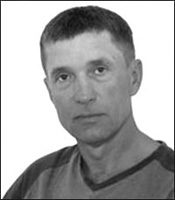New York, December 22, 2009—The Committee to Protect Journalists called on Kazakh authorities today to thoroughly investigate the apparent murder of visiting Kyrgyz journalist Gennady Pavlyuk. Pavlyuk, at left, who is better known by his pen name, Ibragim Rustambek, died in the hospital this morning after falling from an upper-story window of an apartment building in Kazakhstan’s economic capital, Almaty, last week.
Pavlyuk, 40, described by colleagues as one of Kyrgyzstan’s most prominent journalists, had traveled to Almaty from Bishkek on business on Wednesday; the exact purpose of the trip remains unclear. According to some local reports, Pavlyuk intended to start a pro-opposition online newspaper in the next few months, and had traveled to Almaty to meet with potential Kazakh partners on that project; according to other reports, Pavlyuk had undertaken a reporting trip to investigate the activities of a transnational criminal group specializing in car theft.
Pavlyuk, an ethnic Russian, had headed the Kyrgyz bureaus of the Russian newspapers Argumenty i Fakty and Komsomolskaya Pravda before becoming the editor-in-chief of the independent Kyrgyz newspaper Bely Parokhod—a publication known for its investigations of top-level corruption. In the past several months, however, he had abandoned his staff jobs to freelance and plan the launch of his own publication, according to CPJ contacts in the region. In his articles, Pavlyuk often criticized the policies of Kyrgyz President Kurmanbek Bakiyev and his government, said Marat Tokoyev, head of a Kyrgyz press freedom group called Public Association “Journalists.”
Pavlyuk was found unconscious on Wednesday evening, sprawled on the overhang of an apartment building’s entrance in Almaty, his hands and legs bound with tape, the Kazakh Ministry of Interior, which has launched a murder probe, said today.
“We call on Kazakh authorities to thoroughly and aggressively investigate the apparent murder of Gennady Pavlyuk, including the possibility that he had been killed in retaliation for his critical reporting on the Kyrgyz government,” said CPJ Europe and Central Asia Program Coordinator Nina Ognianova. “Pavlyuk was a well-known critic of Kyrgyz authorities. We urge Kazakh investigators to work together with their Kyrgyz counterparts to investigate whether his death was linked to his work.”
It is unclear why Pavlyuk had gone to the building where he died and whom he had met with there. A police search found a roll of tape, Pavlyuk’s jacket, the key to the Almaty hotel room he had checked into earlier the same day, and an empty laptop bag in a sixth-floor apartment above, the ministry said. The ministry said it was considering all possible motives for killing, but did not elaborate.
The Kyrgyz news agency AKIpress reported that a security camera had caught the image of an unknown man with whom Pavlyuk had left his Almaty hotel earlier that day. The windows in the apartment, from which Pavlyuk fell, were not broken, AKIpress said. Pavlyuk suffered multiple injuries caused by the fall, according to doctors with Almaty’s central city hospital where the journalist was treated. This morning he died from the injuries, never having regained consciousness, the independent Kazakh newspaper Respublika reported.
“The frequent recent attacks—and now the death—of our colleagues make it extremely difficult for the rest of us to do our jobs,” Tokoyev told CPJ. “Most of the time, the attackers go unpunished and this creates an atmosphere of hopelessness and fear.”
Last week, CPJ called for an end to the unrelenting wave of unsolved attacks on journalists covering Kyrgyzstan. In two separate cases on December 15, a journalist was beaten and a newspaper received a bullet in an envelope along with threatening notes. The week before that, several other journalists and political analysts received anonymous letters urging them to stop reporting and leave Kyrgyzstan. The October 2007 murder in Osh of ethnic Uzbek editor Alisher Saipov remains unsolved.
Kazakhstan, the neighboring country north of Kyrgyzstan, has had its own commitments to press freedom and democracy under intense scrutiny in the lead-up to its assumption in January of the 2010 chairmanship of Europe’s top security and human rights monitoring body, the Organization for Security and Co-operation in Europe.
